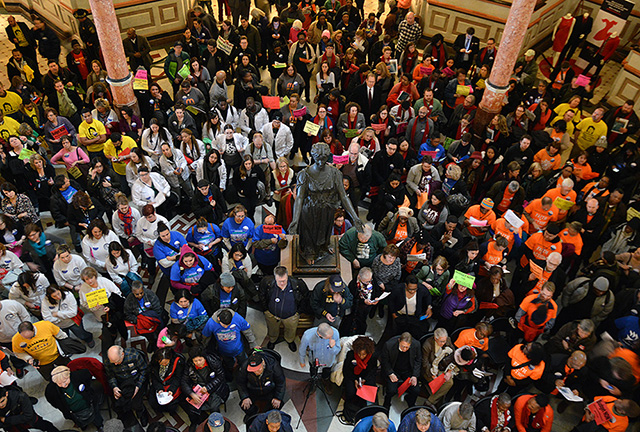Rauner Says Illinois Should Be More Competitive In State Of The State Address
By aaroncynic in News on Jan 27, 2016 10:21PM
 Hundreds of demonstrators pack the Capitol rotunda ahead of Governor Bruce Rauner's 2016 state of the state speech. Photo by Aaron Cynic/Chicagoist
Hundreds of demonstrators pack the Capitol rotunda ahead of Governor Bruce Rauner's 2016 state of the state speech. Photo by Aaron Cynic/Chicagoist
Gov. Bruce Rauner delivered his second “State of the State” address Wednesday in Springfield as Illinois nears entering its eight months without a budget. In a 30 minute speech teeming with dropped g’s, Rauner took aim at unions and state Democrats who have fought his ‘Turnaround’ agenda, saying that Illinois needed to be focused on being competitive with other states.
“All I'm askin’ for is a return to balance in this state—'cause right now, we don't have competitive balance and jobs are leavin’,” Rauner said in his well practiced folksy way of speaking to the public. “Instead of letting Indiana and Texas take our workers, let’s go compete and take their jobs!”
Rauner and state Democratic legislators have butted heads frequently since he took office last year, and the state has been without a budget for months. Before he moves forward on a budget, he demands lawmakers prioritize his pro-business ‘Turnaround’ agenda, which would drastically weaken the state’s labor movement. “To see more people employed at high pay, we need to stop crushing employers,” said Rauner, hammering home his love for big business. “To create good jobs, we need more job creators.”
State democrats have said that Rauner’s proposals have little to do with the actual budget, and have harshly criticized the governor for the impasse, which has forced many social service agencies and other entities that depend on state money to make drastic cuts. Last week, the same day the Governor’s office its hire of a chief of staff for Diana Rauner at $100,000 a year, Lutheran Social Services announced it would have to eliminate 750 jobs and cut services provided to nearly 5,000 people. Democrats have insisted that Rauner is to blame for the cuts, while the governor has insisted it’s their own fault for not passing his agenda.
During his speech however, the governor made an attempt to show he’s making an effort to work with Democratic lawmakers, citing his willingness to move forward with a plan to help alleviate the state’s pension crisis. “As a first step toward bipartisan compromise, President Cullerton and I have agreed to support his pension proposal that will save $1 billion/year from four of the state pension plans,” said Rauner. As part of ten long-term goals he introduced, Rauner also said he would “work closely” with Cullerton to “increase state support for education.”
Despite this, he had strong words for AFSCME, the largest union which represents state workers. “Unfortunately, the compensation demands being made by AFSCME leaders are out-of-touch with reality,” said Rauner, who later accused state workers of manipulating overtime policies.
Closing his speech out, Rauner said that to achieve compromise, “we must cast partisanship and ideology aside.” “Our job in this Capitol is to improve the lives of all the people of Illinois, through more economic opportunity, better educational opportunity, and more value for their hard-earned tax dollars,” said Rauner.
The governor’s critics however, found his words empty, and called him out for spending more time outlying an agenda they say will be harmful, rather than addressing the immediate concern of the budget impasse. Speaking on behalf of the Responsible Budget Coalition, which packed the rotunda with people prior to Rauner’s speech, Dan Lesser, Director of Economic Justice for the Sargent Shriver National Center on Poverty Law, said:
The Governor treated the enactment of a fully funded budget that invests in families and communities as an afterthought, failing to mention the issue until the final two minutes of his speech. This is despite hundreds of families chanting outside the chamber doors, calling for the enactment of a responsible budget immediately.
Emily Miller, director of policy and advocacy at Voices for Illinois Children, said the agenda Rauner outlined in his speech could have long term negative consequences if the state can’t keep funding for social services in tact. “Unfortunately, long-term structural reforms will not have the desired positive impact if we continue to disinvest in the families and communities and destroy the state-funded structures that provide public services due to the lack of a fully funded state budget,” Miller said in a press release.